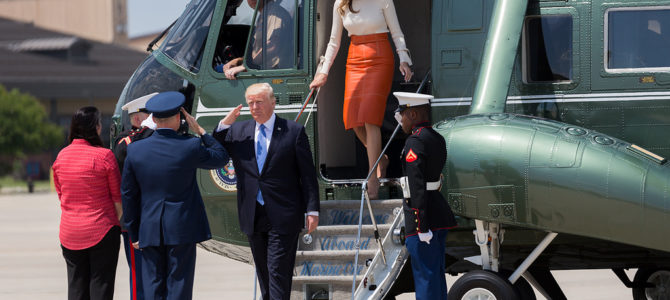
It seems no American is neutral on Donald Trump. The chasm dividing liberals and conservatives grows wider with every tweet and new investigation, only reinforced by partisan media.
The public square has been reduced to a shouting match. From music artists to business leaders, many on the Left mandate strict resistance to the Trump presidency. Meanwhile, some on the Right use war imagery to encourage firm loyalty over any criticism of the administration. Yet many are still seeking to understand this unpredictable president—what he’s accomplished, how he’s failed, and the hard truths both sides refuse to admit.
As facts become harder to determine and issues more complex, citizens’ interest in holding our leaders accountable will wane with summer pursuits. There is no better time to assess the most significant wins and failures—including a couple toss-ups—of the Trump presidency so far.
1. Win: Instituting Several Strong Pro-Life Policies
President Trump has taken decisive action to protect vulnerable lives in the womb. On his first Monday in office, he signed the Mexico City policy, halting $600 million in taxpayer funds from groups overseas that provide and promote abortion.
Weeks later, the State and Defense Departments defined the policy to exclude U.S. taxpayers from funding family planning programs that export abortion practices globally. Melanie Israel of The Heritage Foundation explains: “Importantly, the policy does not reduce funding for global health assistance. Rather, it ensures that [over $8 billion in U.S. tax dollars] are not entangled with the abortion industry.”
Of the 37 bills signed into law this year, Congress passed one major pro-life bill: the Title X Congressional Review Act. It enables states to halt funding for health care providers that also provide abortion services (i.e., Planned Parenthood) and redirect it to comprehensive women’s health clinics. Underlining how divided our nation is on abortion, the Senate’s tie on the bill was broken only when Vice President Mike Pence cast a rare deciding vote.
2. Failure: Overly Broad Executive Order on Immigration
Knowing that making good on their immigration platform plank would be controversial, the Trump administration followed a path taken often during the Obama presidency: releasing news late on a Friday to avoid public scrutiny. It backfired. With key officials apparently left out of the loop on the January 27 executive order, chaos resulted at airports in America and abroad.
According to State Department figures, approximately 90,000 people were affected by this poorly conceived and executed policy change, including refugee children detained, scholars denied entry, and Iraqi pilots stranded while training with U.S. military units. Human rights advocates note the U.S. refugee program has provided entry to essentially zero terrorists.
Federal courts have also blocked a revised travel ban issued on March 6, though even critics acknowledge the new order adheres to the Constitution. Perhaps as a concession to immigration rights activists, last week the Department of Homeland Security announced that so-called “dreamers” would not be deported.
3. Toss-Up: Can the Capable National Security Team Execute?
For all the focus on domestic issues, the U.S. Constitution gives greatest leeway to the president on foreign policy. Even fierce critics of President Trump, such as military historian Max Boot, acknowledge he has assembled an A-list foreign policy team. As he’s listened to advisors, Trump’s positions have changed: supporting the North Atlantic Treaty Organization (NATO), rejecting waterboarding as a just strategy, and finding common ground with Mexico, just to name a few.
After he traveled to the front lines of the ongoing battle against ISIS, Gen. James “Mad Dog” Mattis altered strategy to finally conquer a terrorist stronghold. Meanwhile, Secretary of State Rex Tillerson spoke out strongly against illegal Russian aggression. President Trump has successfully lobbied Italy and other European nations to contribute their fair share towards funding NATO.
Yet leaning on expert advice is rarely President Trump’s first move. He appointed controversial advisor Steve Bannon to the National Security Council, until outcry caused him to reverse course. And his petty response to London’s mayor facing crisis is the latest of many self-inflicted international incidents. Will President Trump task a wise staff member with vetting his Twitter posts?
4. Win: Taking a Strong Stand Against Anti-Semitism
Confirmed by a Senate vote of 96-4 on January 24, United Nations Ambassador Nikki Haley has made standing against anti-Semitism a core issue as America’s voice at the UN. “Israel exists in a region where others call for its complete destruction and in a world where anti-Semitism is on the rise; these are threats that we should discuss at the United Nations,” she stated boldly before the UN Security Council on February 16.
She’s been getting results. After Haley challenged a report one UN commission issued as “anti-Israel,” the responsible UN official was forced to resign. In tandem with senators Marco Rubio (R-FL) and Chris Coons (D-DE), Haley coordinated a letter delivered to UN Secretary General António Guterres expressing views co-signed by all 100 U.S. senators.
“Although, as Republicans and Democrats, we disagree on many issues, we are united in our desire to see the United Nations improve its treatment of Israel and to eliminate anti-Semitism in all its forms,” the letter stated. President Trump echoed this message during his April 25 speech at the U.S. Holocaust Memorial Museum, saying, “Those who deny the Holocaust are an accomplice to this horrible evil. And we’ll never be silent—we just won’t—we will never, ever be silent in the face of evil again.”
5. Failure: Lack of Transparency Fuels Distrust
In a stark reversal from the Obama administration, the Trump White House announced on April 14 that it will not release records of all visitors. In fact, such logs will be kept confidential until five years after President Trump leaves office.
While Politico has released a crowdsourced database of known White House visitors, journalists can only know so much without transparency. Furthermore, President Trump’s failure to open his tax returns to public scrutiny—breaking with over 40 years of presidents providing these documents—only fuels speculation that his administration has something to hide.
6. Win: Reversing Abusive Executive Actions
Many criticisms lobbed at President Donald Trump would apply to any Republican administration because they come down to differing assumptions about government and the economy, on which our nation is divided 50/50.
A significant number of President Trump’s executive orders thus far simply reverse unilateral actions from President Obama. Politico enumerates dozens of regulations the Trump administration has reversed, while Sen. Jim Inhofe (R-OK) offers particular praise for the policy changes on energy and the environment. Among the president’s first executive orders was a novel approach: for every new regulation issued, two prior regulations must be eliminated.
Professor Rena Steinzor, an expert on federal deregulation, states in Politico: “I’ve been watching through six presidents, and all that pales in comparison to this.” That sounds like the platform Trump voters elected. But as the Obama administration has found, policy changes may be short-lived unless enacted through Congress.
7. Failure: Running the West Wing like a Family Business
As one who rewards loyalists and keeps family close, it is natural for President Trump to want his daughter and son-in-law working in the White House. The only problem? Many experts consider it unethical if not illegal, although longtime Trump lawyer (now White House counsel) Don McGahn has found a loophole.
Young Ivanka Trump and Jared Kushner, as new as the president to crafting policy, now head up a wide range of policy issues including the Middle East peace process, criminal justice reform, relations with China, and reversing the opioid crisis—without being elected by the public, or confirmed by the U.S. Senate. Last week, reports emerged that Kushner’s business dealings would be part of the investigation by special counsel Robert Mueller.
Chinese officials, preferring a family dynasty over State Department contacts, have exploited the relationship despite the questions it has raised. Meanwhile, some in the U.S. military are not keen on the young businessman calling the shots.
8. Toss-Up: It Was the Best of Staff, It Was the Worst of Staff
One must forego one-line partisan summaries (either “basket of deplorables” or “conservative all-stars”) to consider Trump administration appointments.
Some early choices were unfit for their roles. Gen. Michael Flynn, whom many pegged in November as a lobbyist for Turkey, was soon under FBI investigation for allegedly inappropriate contacts with Russian officials, even before he resigned on February 13. When Republican senators refused to back Andrew Puzder as Labor secretary over moral and ethical concerns, the Trump administration offered a more palatable pick in Alexander Acosta.
Controversy continues to surround some figures serving in the administration, notably Bannon and the aforementioned Trump family members. Underlining how new this team is to government policies, two members of the Trump White House have been publicly reprimanded by the Office of Special Counsel for careless statements.
Many positions have also been filled with respected conservative leaders. In addition to his confirmed cabinet, President Trump brought on House Freedom Caucus co-founder Mick Mulvaney to head his budget team, which now includes Paul Winfree (of The Heritage Foundation) and Russ Vought (of Heritage Action for America). Conservative stalwart Paul Teller also made the leap from Capitol Hill to the White House, serving in legislative affairs.
Health and Human Services Secretary Tom Price named several pro-life leaders to his team including Charmaine Yoest (formerly of Americans United for Life), Valerie Huber (co-founder of Ascend), and Teresa Manning (formerly of National Right to Life Committee). The longtime disability advocate and a strong voice against euthanasia Melissa Ortiz was also recently appointed to the Administration for Community Living within HHS.
In short, the Trump administration has assembled many of the sharpest minds in conservative policy circles, along with a few initial picks that leave lingering questions.
9. Win: Justice Neil Gorsuch Confirmed to the Supreme Court
On April 7, by a 54-45 vote, the Senate confirmed Neil Gorsuch of Colorado as an associate justice of the U.S. Supreme Court. This vote brought to a close a process that began 14 months before, when Justice Antonin Scalia passed away unexpectedly on February 13, 2016. Not since 1970 had a Supreme Court seat remained open for over a year.
The victory was a testament to a persistent “let the voters decide” strategy of Majority Leader Mitch McConnell (R-KY), advocacy groups like Judicial Crisis Network, and the pro-life movement that has elevated the court to a paramount election issue. Already Gorsuch’s voice on the bench has echoes of Scalia.
Significantly, Senate Democrats’ opposition to Gorsuch led Republicans to pass a bill ending the filibuster for judicial nominees, making it simpler for the majority to confirm future justices. As rumors continue to swirl of future Supreme Court vacancies, the judiciary may yet prove to be President Trump’s most lasting legacy.
10. Failure: Often Choosing to Be a Showman Rather than Statesman
“The most effective opponent of the Trump Presidency is Donald J. Trump himself,” stated the Wall Street Journal in a recent op-ed. The president’s own tweets have created the biggest headlines of his administration—accusing President Obama of wiretapping, arguing over inauguration crowd size, responding to the former FBI director like a mafia boss, and other posts that stretch the bounds of believability.
While still learning public policy, President Trump understands mass media. He’s lived in Trump Tower for decades, two blocks from Times Square—the center of 24/7 entertainment in New York City. As media personalities often get higher ratings from taking cheap shots, surely he sees how politicians gain short-term benefits (read: winning the next election) from blatant partisanship.
President Trump has worked political incorrectness into his brand, and he was loved for it on the campaign trail. Yet governing a divided nation is a new ballgame with different rules. Perhaps there was a reason most of his predecessors took cues from the first president.
As a boy, George Washington memorized 110 maxims that later became a book entitled “Rules of Civility and Decent Behavior.” “Speak not injurious words, neither in jest nor earnest; scoff at none although they give occasion,” states rule 65—a good guide for Twitter posts. It’s a far cry from “Think Big and Kick Ass in Business and Life,” written by our current president.
It’s accurate to say the Left has been unreasonable about Trump; it’s also true citizens should be aware that real conflicts of interest exist in this administration. Rather than staying insulated from tough criticism, President Trump should reach beyond his small circle of advisors to consider the road ahead.
Good governance requires leaders of integrity working together with mutual respect to solve real problems. Five months into the Trump administration, an investigation seeking to find those qualities in either party would shut down for lack of evidence.









